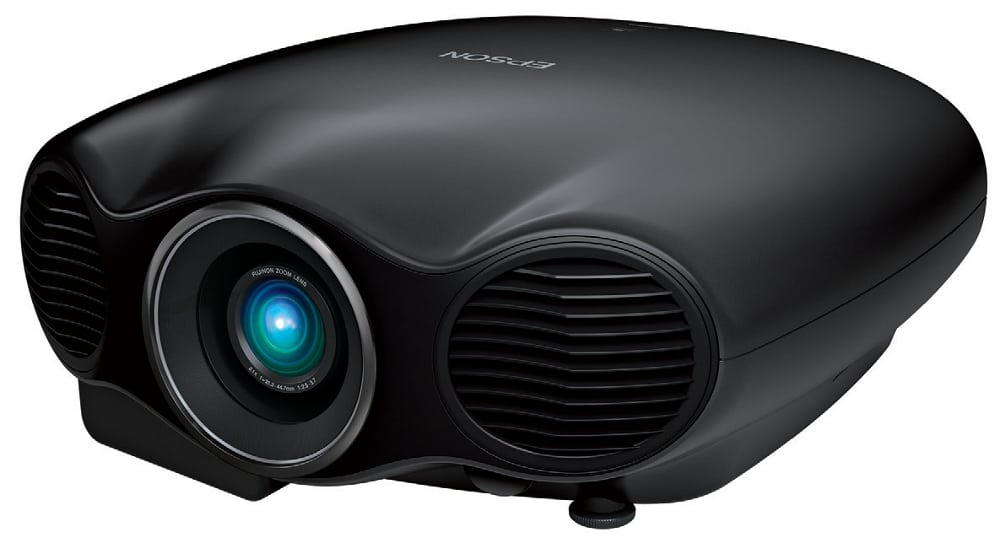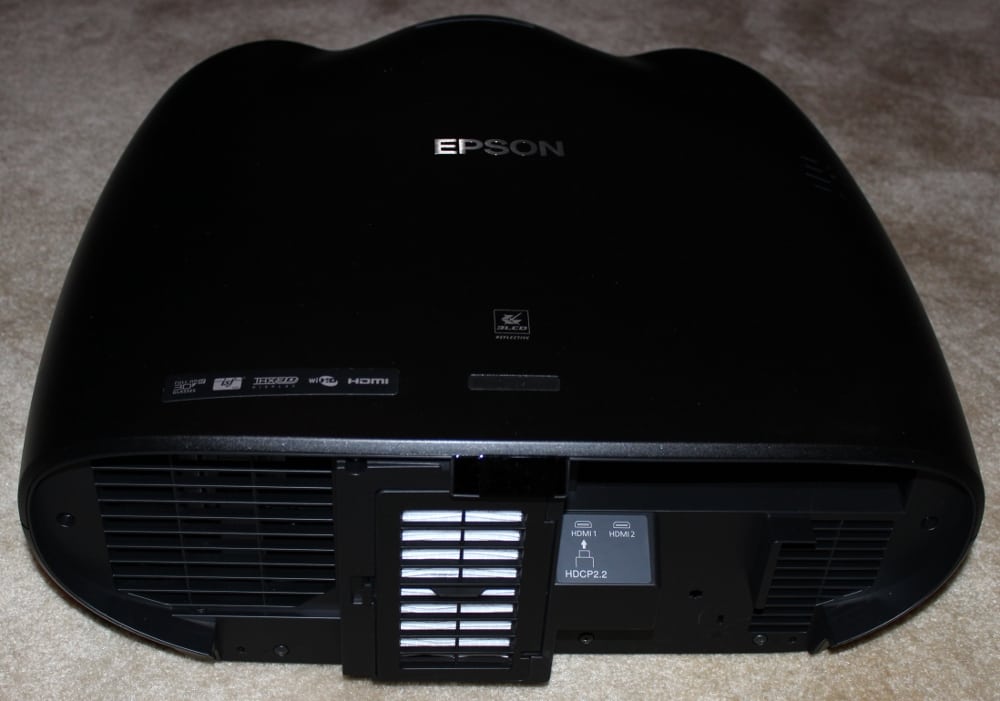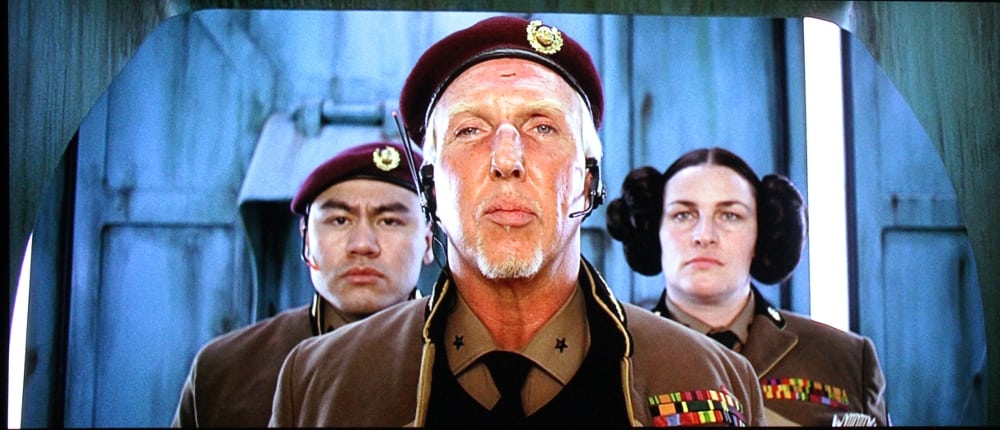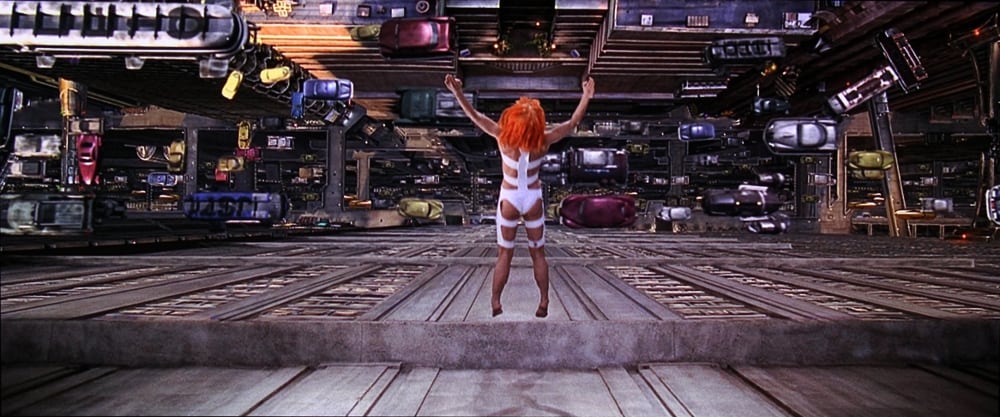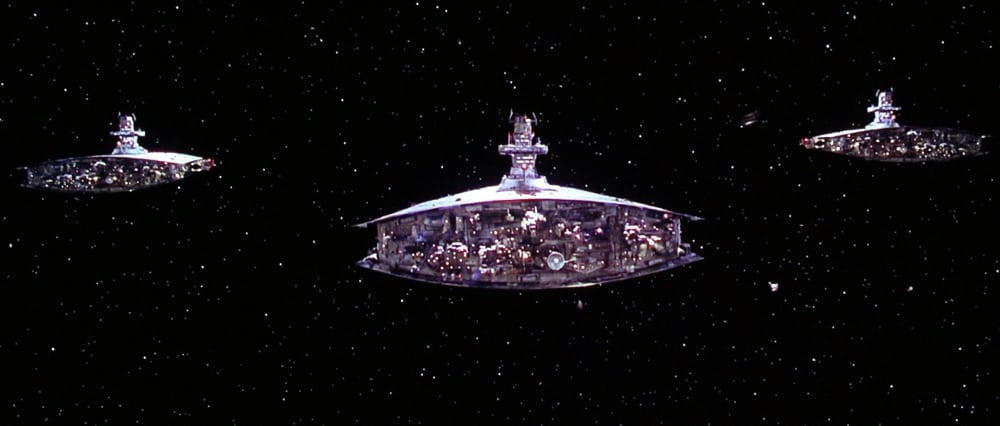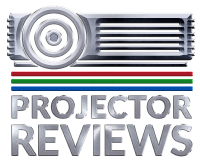Capabilities
As Epson’s flagship 1080p home theater projector, the Pro Cinema LS9600e is feature laden. In realty both the LS10000 and the LS9600e can be considered flagship models. Since the LS10000, while using 1080p display chips, also has pixel shifting for near 4K resolution, while the LS9600e is strictly a 1080p projector.
Let’s start our summary with the new technologies.
A solid state light source features dual blue lasers and a long life of 17,00 hours (at full power) and 30,000 in Eco mode. That folks, is longer than the practical life of the projector, for most users.
When the Dynamic Contrast function is turned on, the LS10000 uses dynamic laser diming, instead of a conventional dynamic iris, but the dimming only begins when it gets to a really dark scene. The effect of the dynamic contrast function is especially noticeable as the pictures dims to full black, such as in between scenes. It’s stunning to see (or, really, not see) total blackness.
But this Epson achieves some pretty competitive black level performance even when the dynamic contrast feature is turned off. Epson hasn't published a useful contrast ratio or black level specification, instead just saying it is absolute black, though the total blackout only really comes into play on those totally black scenes. If there’s just a small amount of even extremely dark content, the lasers are back on, and the blacks aren’t near as black (still very good but not totally black). Since Epson's spec. is not very informative as to the black level and contrast ratio when the dynamic contrast function is turned off, I went ahead and measured the actual on/off contrast ratio and also the ANSI contrast ratio. You will find these values in the performance section of this review. The bottom line is I would rate the on/off CR as excellent and the ANSI CR very good.
Picture Quality and Brightness
Above, are screen shots from a mix of 1080i, and 1080p sources. Pre-calibration the Epson puts up a good looking image in THX and Natural modes, which are similar, but the Natural mode is a little brighter. It is pretty good right out of the box in terms of color accuracy. After being calibrated, the LS9600e the color accuracy was further improved and became extremely accurate. Despite the solid state laser light source, this projector puts out images that look very much like a good lamp-based projector.
One trick up the Epson’s sleeve is that the laser light source boasts a great deal larger range of colors than lamp-based projectors. This model, unlike the LS10000, does not have picture modes for Adobe or (4K) Digital Cinema. However, the projector's native color space, when running in Dynamic mode, actually comes close the wide DCI-P3 color space. Current standards for HD video use REC 709 color space while Ultra HD Blu-rays are expected to support wider color spaces including DCI-P3. It's not clear we will ever have a need to support colors spaces wider than Rec. 709 in a 1080p projector, but who knows, we might.
So, add to a very good color picture, plenty of brightness, with around 800+ lumens calibrated. That’s pretty bright for my 120" (gain 1.1) screen, and brighter than a calibrated Epson 5030UB/6030UB projector. I found it bright enough even in 3D mode, but some others may want to use either a smaller or higher gain screen, or just move up to the brighter LS10000, to get a brighter 3D picture.
Overall 3D is great - with among the least 3D crosstalk/ghosting that I can recall seeing from any non-DLP projector. There’s adequate brightness, as I already mentioned, to do a reasonable job on my 120″ screen in Dynamic-3D mode, while a 100" (or smaller) or a higher gain screen would be a better match for the more accurate THX-3D mode.
The Competition
With a MSRP of $5999, and generally no discounting of Epson's Pro Cinema projectors, it makes sense to compare this price to what's available with a street price in the $6K range. For that price you can probably get one of JVC mid-range models (DLA-RS67 or X700) that offers better native on/off contrast ratio and a dynamic iris. However, Epson's absolute black for fades to black, or any other totally black scene, does become almost intoxicating and there won't be any audible noise or pumping of black levels than can occur when a dynamic iris is being used. Basicially the JVCs will appear darker on most dark scenes while the Epson can do a fade to a totally black. Both are excellent at displaying shadow details in dark scenes.
The JVCs have pixel shifting for pseudo 4K (along the lines of what Epson is doing with their LS100000) while the LS9600 is a traditional 1080p projector. While the JVCs do put up a pseudo 4K/UHD image they do not have a HDMI 2.0 w/ HDCP 2.2 input and as a result are not going to be compatible with the upcoming Ultra HD Blu-rays or potentially other future UHD video sources. As a result, the primary use for pixel shifting on the current JVC projectors is for upscaling 1080p video.
The JVC will put out more calibrated lumens than the LS9600e, as least for the first few hundred of hours after the JVC gets a new lamp. One big factor in the Epson's favor is the use of the long lasting laser light engine, which eliminates the need to replace lamps after every 3000 of use or the need to periodically have the projector re-calibrated as the lamp ages or is replaced. I'm not going so far as to say you should buy this Epson over a mid-level JVC projector or vise versa. It really all comes down to what's important to you, as they are both great projectors.
As for other competitors, they are generally at lot less or a lot more expensive than the LS9600. From Sony you have the much less expensive VPL-HW55es, as true 1080p model, but one lacking power focus, zoom, lens shift and of course there is no lens memory. As expected it uses a convential lamp that must be occasionally replaced. It is one of the better sub-$4000 projectors, but not a match for the LS9600e's picture quality. Sony also has their native 4K projectors, but these start at near $10k with the new VPL-VW350es.
Other lower priced projectors include Epson's own UB series (e.g., Pro-Cinema 6030UB) and using DLP technology there is the BenQ W7500. While these are good buys in the sub-$3K price range, they cannot match the performance and features of the LS9600e.
So which other projector is the LS9600e's biggest competition? Actually it's probably the LS9600e's big brother, the Epson LS10000. Sure it costs $2K more, but it offers higher lumens and I suspect the LS10000's "4K Enhancement" feature, that offers compatibility with the upcoming (4K) Ultra-HD Blu-rays, will be a big plus for many considering a new projector purchase in this price range.

